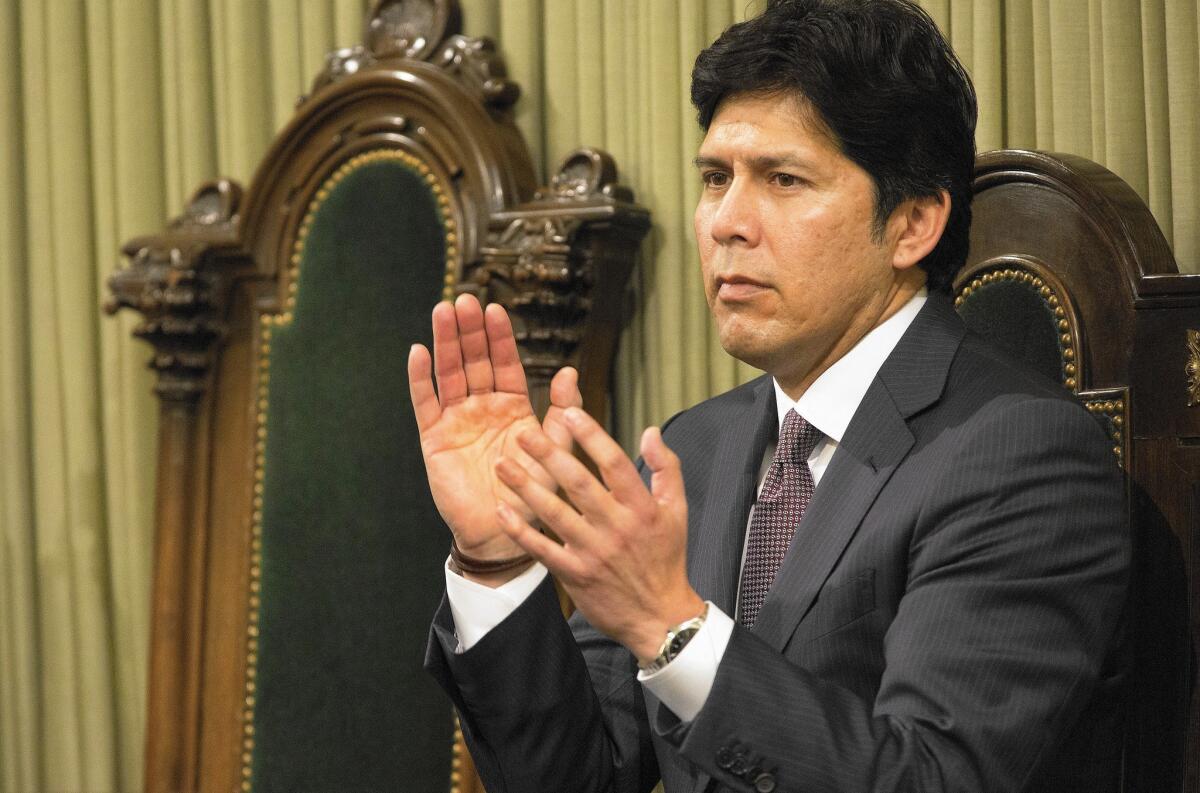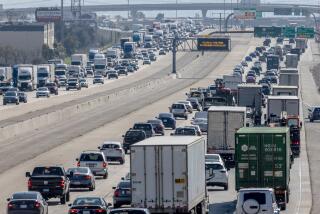State Senate leader will introduce measure to counter Southern California air board’s industry-friendlier plans

The leader of the state Senate said Tuesday that he will push to reverse efforts by the Southern California air quality board to adopt pollution rules friendlier to industry, saying swift action is needed to prevent a rollback of environmental gains.
State Senate President Pro Tem Kevin de León (D-Los Angeles) said he will introduce legislation to add three new members to the South Coast Air Quality Management District board — one public health expert and two environmental justice members — to represent communities suffering from pollution.
The move comes days after the South Coast air board’s new Republican majority voted to fire longtime executive officer Barry Wallerstein and to reaffirm the panel’s recent adoption of oil industry-backed emissions rules on refineries and other major pollution sources.
De León’s proposal probably would mean more aggressive steps to curb pollution and would give the state legislature and Gov. Jerry Brown greater influence over the agency charged with protecting the health of 17 million people in the nation’s smoggiest region.
“This has been a wholesale takeover, to the detriment of children and families who breathe these harmful contaminants into their lungs every single day,” De León said. “We have progressed on our policies, we cannot go backward.”
Under de Leon’s plan, two of the additional appointees would be selected by state legislative leaders. The public health member would be appointed by the governor, increasing the panel from 13 to 16 members.
Recent appointees to the air board, including Highland Mayor Larry McCallon and Lake Forest Councilman Dwight Robinson, have said they want the agency to give more emphasis to the economic burden posed by tougher emissions regulations. Republicans gained a seven-member majority with the swearing in of Robinson last month following a campaign by GOP leaders to gain control of the regulatory agency.
Currently, 10 members of the board are city council members, mayors and county supervisors who are chosen by other local elected officials in Los Angeles, Orange, Riverside and San Bernardino counties. Three members are appointed by the state Assembly speaker, Senate leadership and the governor.
All members serve four-year terms. De León’s proposal would eliminate terms, with board members instead serving at the will of the officials who appoint them.
Air quality board Chairman William A. Burke, a Democrat, said he supports De León’s proposal and “anything that would bring balance back to the board.”
Debra Mendelsohn, air quality deputy for Republican L.A. County Supervisor Michael D. Antonovich, countered that “bigger is not better. Increasing the AQMD board will not result in any reduced emissions and will only result in increased bureaucracy.”
David Englin, executive vice president for the Los Angeles County Business Federation, said his group did not have a position on the proposal but hoped any new appointees would “understand that clean air and good-paying jobs are both vital for public health.”
Before firing Wallerstein, the AQMD board Friday voted 8 to 5 not to reconsider its December decision to adopt a regulation backed by the Western States Petroleum Assn. and other industry groups.
The board rejected a proposal by air district staff to overhaul the agency’s decades-old cap-and-trade program for curtailing smog-forming emissions from oil refineries, power plants, factories and other large facilities.
Wallerstein and his staff proposed reducing the cap on nitrogen oxide pollution by 14 tons per day over the next seven years. The board adopted a plan to cut 12 tons per day, with the steepest cuts delayed until later in the seven-year period.
The move is expected to delay installation of emissions controls at the region’s major oil refineries and slow progress in reducing ozone, a lung-damaging component of smog that is linked to asthma, heart disease and premature deaths. Ozone exists at the nation’s highest concentrations in the inland valleys and mountains of Southern California.
The California Air Resources Board has taken the unusual step of criticizing the board’s decision, saying it violates state law and will harm public health. The Senate Environmental Quality Committee has asked the board to reconsider.
The air quality panel’s refusal to do so has put it on a collision course with state regulators and California’s Democratic legislative leadership, which draws heavily from the Los Angeles region and has made air pollution and environmental justice a top priority.
“They’re basically picking a fight with the largest delegation in the California legislature that has the most votes,” said Dean Florez, a former state legislator who was recently appointed to the California Air Resources Board.
Brown signed legislation last year that added two new legislature-appointed members to the state air board.
In the near-term, the shift on the South Coast board is likely to stir debate over a new air quality plan due this year that will determine how emissions must be cut to meet federal health standards for ozone and fine particle pollution.
The change also cast uncertainty over a variety of proposals targeting industries across the L.A. basin that have resisted tighter restrictions on their operations. Air district staff has been preparing rules to reduce toxic emissions and cancer risk from refineries, metal factories and other manufacturing operations as well as measures to hold the nation’s largest port complex accountable for its pollution-reduction targets.
Also planned are regulations to cut emissions from urban oil drilling sites, to sell more pollution credits for the operation of gas plants and to reduce foul odors from animal rendering plants and smoke from charbroiling restaurants.
“Our health is impacted every day by the decisions this board makes,” said Angela Johnson Meszaros, an attorney with the environmental law nonprofit Earthjustice who predicted its recent decisions “will galvanize people and organizations to take actions to defeat this power grab.”
More to Read
Start your day right
Sign up for Essential California for news, features and recommendations from the L.A. Times and beyond in your inbox six days a week.
You may occasionally receive promotional content from the Los Angeles Times.






